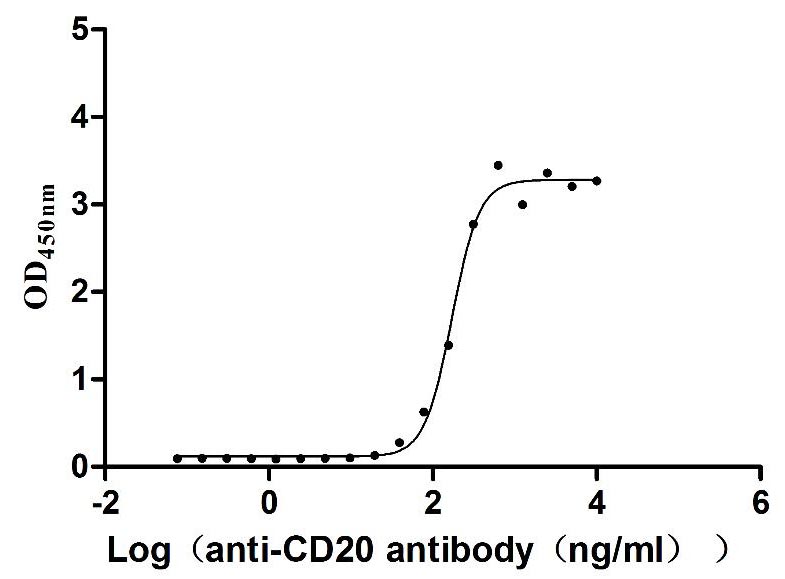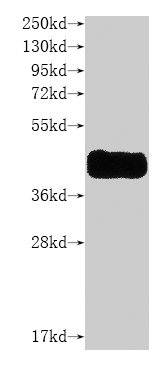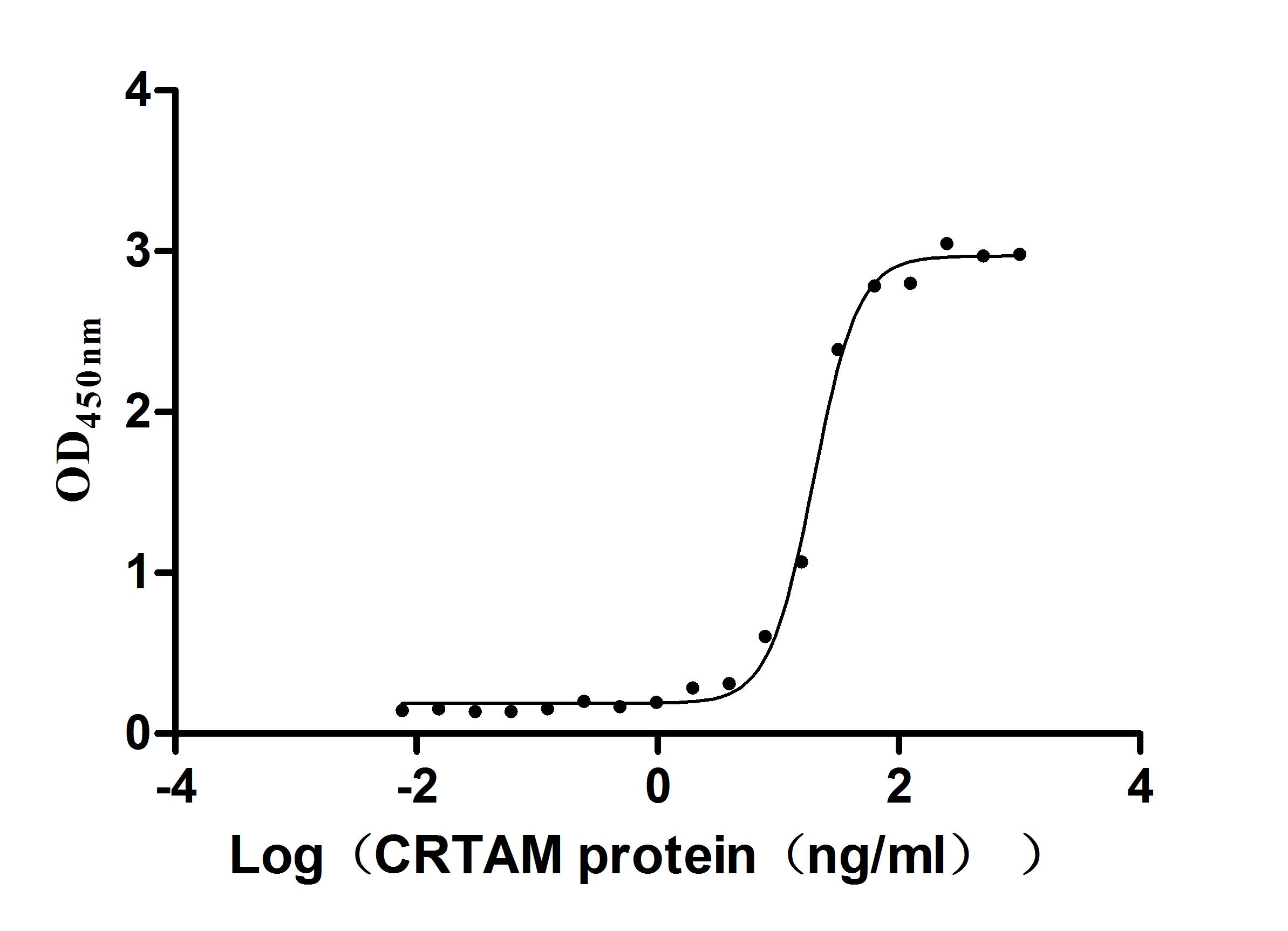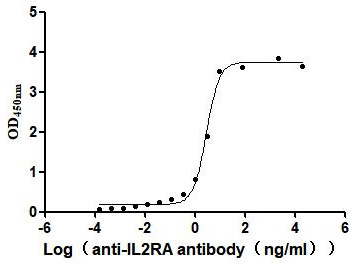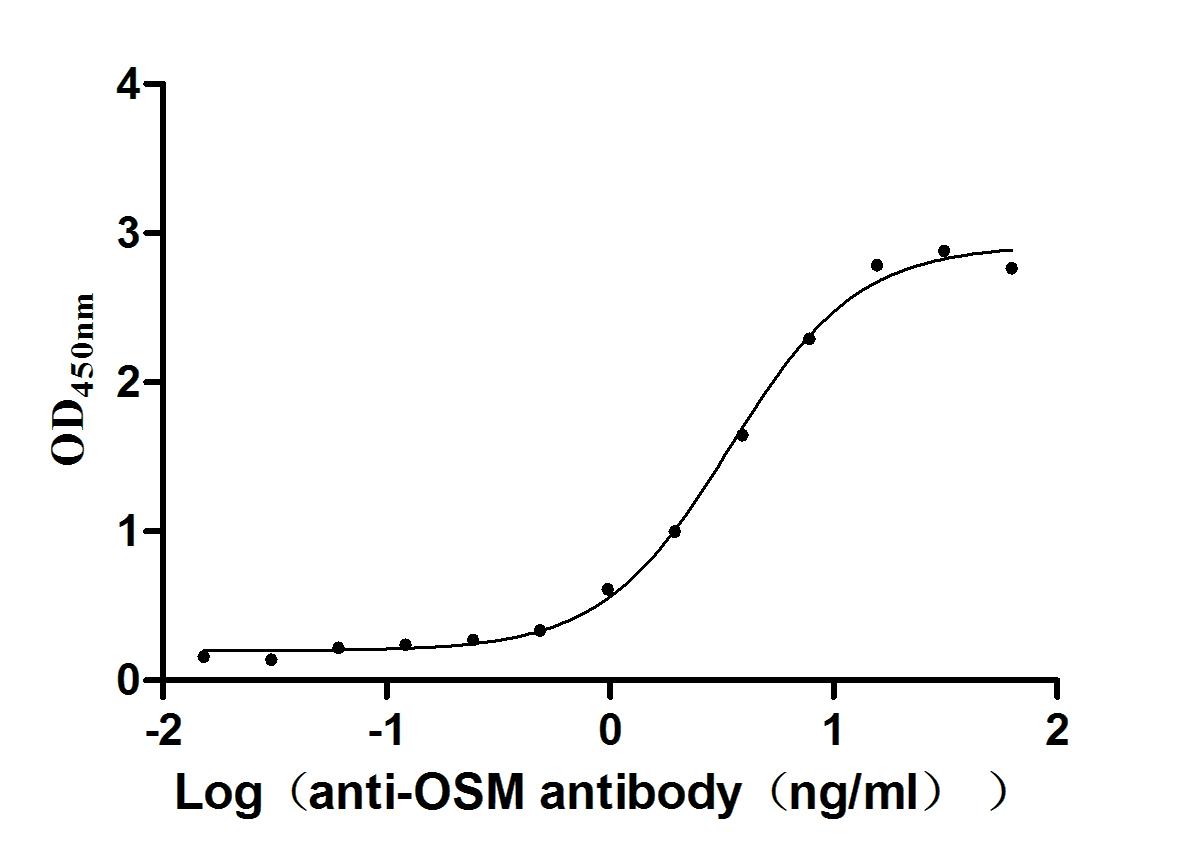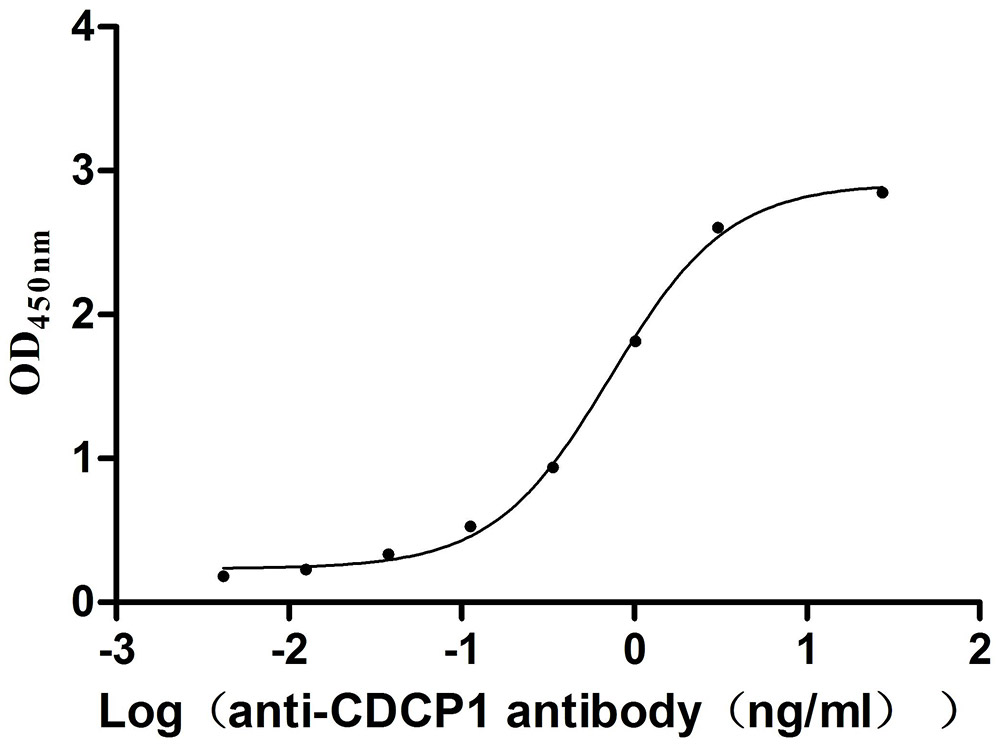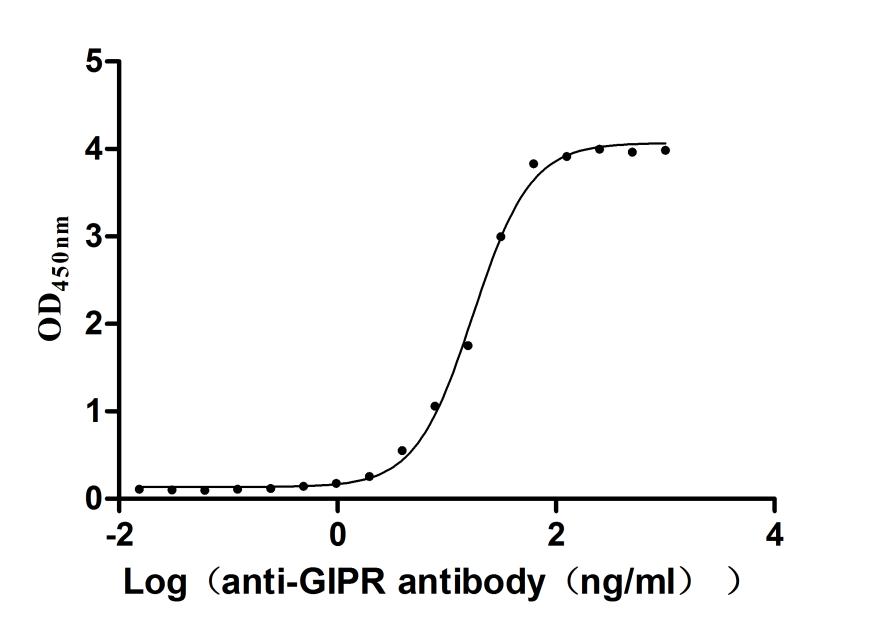Recombinant Human RNA-binding protein Musashi homolog 1 (MSI1)
-
货号:CSB-YP015033HU
-
规格:
-
来源:Yeast
-
其他:
-
货号:CSB-EP015033HU
-
规格:
-
来源:E.coli
-
其他:
-
货号:CSB-EP015033HU-B
-
规格:
-
来源:E.coli
-
共轭:Avi-tag Biotinylated
E. coli biotin ligase (BirA) is highly specific in covalently attaching biotin to the 15 amino acid AviTag peptide. This recombinant protein was biotinylated in vivo by AviTag-BirA technology, which method is BriA catalyzes amide linkage between the biotin and the specific lysine of the AviTag.
-
其他:
-
货号:CSB-BP015033HU
-
规格:
-
来源:Baculovirus
-
其他:
-
货号:CSB-MP015033HU
-
规格:
-
来源:Mammalian cell
-
其他:
产品详情
-
纯度:>85% (SDS-PAGE)
-
基因名:MSI1
-
Uniprot No.:
-
别名:Msi 1; Msi1; MSI1H_HUMAN; Musashi homolog 1; Musashi RNA binding protein 1; Musashi-1; Musashi1; RNA binding protein Musashi homolog 1; RNA-binding protein Musashi homolog 1
-
种属:Homo sapiens (Human)
-
蛋白长度:Full length protein
-
表达区域:1-362
-
氨基酸序列METDAPQPGL ASPDSPHDPC KMFIGGLSWQ TTQEGLREYF GQFGEVKECL VMRDPLTKRS RGFGFVTFMD QAGVDKVLAQ SRHELDSKTI DPKVAFPRRA QPKMVTRTKK IFVGGLSVNT TVEDVKQYFE QFGKVDDAML MFDKTTNRHR GFGFVTFESE DIVEKVCEIH FHEINNKMVE CKKAQPKEVM SPTGSARGRS RVMPYGMDAF MLGIGMLGYP GFQATTYASR SYTGLAPGYT YQFPEFRVER TPLPSAPVLP ELTAIPLTAY GPMAAAAAAA AVVRGTGSHP WTMAPPPGST PSRTGGFLGT TSPGPMAELY GAANQDSGVS SYISAASPAP STGFGHSLGG PLIATAFTNG YH
-
蛋白标签:Tag type will be determined during the manufacturing process.
The tag type will be determined during production process. If you have specified tag type, please tell us and we will develop the specified tag preferentially. -
产品提供形式:Lyophilized powder
Note: We will preferentially ship the format that we have in stock, however, if you have any special requirement for the format, please remark your requirement when placing the order, we will prepare according to your demand. -
复溶:We recommend that this vial be briefly centrifuged prior to opening to bring the contents to the bottom. Please reconstitute protein in deionized sterile water to a concentration of 0.1-1.0 mg/mL.We recommend to add 5-50% of glycerol (final concentration) and aliquot for long-term storage at -20℃/-80℃. Our default final concentration of glycerol is 50%. Customers could use it as reference.
-
储存条件:Store at -20°C/-80°C upon receipt, aliquoting is necessary for mutiple use. Avoid repeated freeze-thaw cycles.
-
保质期:The shelf life is related to many factors, storage state, buffer ingredients, storage temperature and the stability of the protein itself.
Generally, the shelf life of liquid form is 6 months at -20°C/-80°C. The shelf life of lyophilized form is 12 months at -20°C/-80°C. -
货期:Delivery time may differ from different purchasing way or location, please kindly consult your local distributors for specific delivery time.Note: All of our proteins are default shipped with normal blue ice packs, if you request to ship with dry ice, please communicate with us in advance and extra fees will be charged.
-
注意事项:Repeated freezing and thawing is not recommended. Store working aliquots at 4°C for up to one week.
-
Datasheet :Please contact us to get it.
相关产品
靶点详情
-
功能:RNA binding protein that regulates the expression of target mRNAs at the translation level. Regulates expression of the NOTCH1 antagonist NUMB. Binds RNA containing the sequence 5'-GUUAGUUAGUUAGUU-3' and other sequences containing the pattern 5'-[GA]U(1-3)AGU-3'. May play a role in the proliferation and maintenance of stem cells in the central nervous system.
-
基因功能参考文献:
- This provides proof of concept for the development of Gn-lip as a molecular therapy for colon cancer with MSI1/MSI2 overexpression. PMID: 30097032
- findings indicate that MSI1 plays a leading role in stress granule formation that grants cancer stem cell properties and chemoresistant stress granules in GBM, in response to stressful conditions via the PKR/eIF2alpha signalling cascade. PMID: 29486283
- Enhanced expression of Musashi-1 was observed in adenomyosis foci in comparison with endometrial cells. The most intensive staining was found in nodular adenomyosis, especially in epithelial cells during the secretion phase. These data attest to the role of somatic stem cells in the development and progression of various forms of adenomyosis. PMID: 28853072
- Msi1 acts as a stemness-associated gene in esophageal cancer cell lines and could serve as a prognostic marker in patients with ESCC. PMID: 28713964
- MSI1 and MSI2 bind and regulate the mRNA stability and translation of proteins operating in essential oncogenic signaling pathways..This review provides a current overview of Musashi as a cancer driver and novel therapeutic target. PMID: 28143872
- Musashi-1 has a role in regulating AKT-derived IL-6 autocrinal/paracrinal malignancy and chemoresistance in glioblastoma PMID: 27285760
- MSI1 was a target of miR-181a-5p, a microRNA involved in the regulation of cancer development. The expression levels of MSI1 and miR-181a-5p were negatively correlated in NSCLC. PMID: 29141252
- Musashi-1 interacts with the Zika genome and enables viral replication. PMID: 28572454
- Msi1promoted epithelial-mesenchymal transformation of cervical neoplasms via activation of the Wnt signaling pathway and contributing to poor prognosis. PMID: 28088346
- our results suggest a role for MSI1 in double-strand break repair and that its inhibition may enhance the effect of radiotherapy PMID: 27470713
- Musashi-1 expression was higher in Barrett esophagus and early esophageal adenocarcinoma compared to advanced adenocarcinoma. PMID: 28216140
- miR-761 and MSI1 are inversely expressed in ovarian cancer tissues. In conclusion, we demonstrated that miR-761 repressed ovarian cancer proliferation and invasion by targeting MSI1 PMID: 26563371
- Concomitant loss of function of both MSI1 is sufficient to abrogate the growth of human colorectal cancer cells, and Msi gene deletion inhibits tumorigenesis in several mouse models of intestinal cancer. PMID: 26673327
- Msi1 overexpression is associated with Esophageal Squamous Cell Carcinoma. PMID: 26294058
- studies highlight Msi reporters as a unique tool to identify therapy resistance, and define Msi signalling as a central regulator of pancreatic cancer PMID: 27281208
- Musashi-1 and ALDH1 expression are closely related to metastasis of ovarian adenocarcinoma. PMID: 25971681
- Suggest high level of Musashi-1 protein expression is associated with poor survival in endometrioid adenocarcinoma patients. PMID: 26191146
- Our results demonstrate that miR-137 acts as a tumor-suppressive miRNA in colorectal cancers and negatively regulates oncogenic Musashi-1 PMID: 25940441
- This review highlights both the essential contribution of RBPs to posttranscriptional regulation and the importance of the Musashi family as master regulators of male gamete development--{REVIEW} PMID: 25851660
- data suggest that in response to environmental cues that oppose cell cycle progression, regulation of Musashi function is required to promote target mRNA translation and cell fate transition PMID: 25888190
- oncogenic role in hepatocellular carcinoma may be through modulation of cell growth and cell cycle by activating Wnt pathway via direct downregulation of APC and DKK1 PMID: 24444033
- we suggest that Musashi-1, Lgr5, and pEGFR are overexpressed in human SIAs and may play roles in human SIA carcinogenesis and progression. PMID: 25773390
- The findings uncover a role for MSI1 as a central regulator of cell adhesion pathways that contribute to Glioblastoma by influencing cell adhesion, morphology, migration, and invasion. PMID: 26100017
- Msi1 was significantely overexpressed in 41.5 % of tumor samples. PMID: 24163304
- High Msi1 promotes tumor growth and cell proliferation by targeting cell cycle checkpoint proteins p21, p27 and p53 in cervical carcinomas. PMID: 25362645
- Knockdown of endogenous Msi1 protein inhibited the growth and tumor formation by activating the cell cycle suppressor p21cip PMID: 25394506
- Msi proteins contribute to an epithelial gene expression program in neural and mammary cell types. PMID: 25380226
- Msi1 is a mediator of TRAIL resistance in HCC cells PMID: 25747387
- an association between a Musashi-1 genotype and lung cancer risk PMID: 24787949
- The principal findings included significantly higher level of Msi-1 expression in younger gastric cancer patients compared to older ones, and probable association of tumor Msi-1 expression in young gastric cancer patients with more aggressive tumor type. PMID: 24452324
- Musashi-1 mediates the downregulation of the 26S proteasome by binding to the mRNA of NF-YA, the transcriptional factor regulating 26S proteasome subunit expression PMID: 24022895
- Aberrant Musashi-1 expression in adenomyosis may be involved in the pathogenesis and pathophysiology of adenomyosis, but it does not correlate with changes in serum estradiol or progesterone levels. PMID: 24365097
- High levels of Musashi-1 were associated with gliomas. PMID: 24057325
- NOTCH3 signaling regulates MUSASHI-1 expression in metastatic colorectal cancer cells. PMID: 24525742
- Msi-1-positive cells may play a key role in the early events of gastric carcinogenesis and may be involved in invasion and metastasis of gastric cancer cells. PMID: 24151393
- our data demonstrated that Musashi 1 is highly and un-differentially expressed in both examined tumoral and apparently normal bladder tissues. PMID: 24061461
- Msi1 regulates the proliferation of stem-like spheroid lung tumor cells in associated with Notch and Wnt signaling. PMID: 23715514
- study provides novel insights into Hedgehog/Msi1 signaling and its role in the regulation of the self-renewal capability of human umbilical cord blood (UCB)-derived mesenchymal stem cells PMID: 23418578
- was a statistical difference between the MSI1 gene expression in intestinal versus diffuse type gastric cancer PMID: 23164718
- Msi1 has different expression patterns in glioma from Grade I to Grade IV, and the different expression patterns play diverse roles in angiogenesis of glioma. PMID: 23017339
- Msi1 functions as a regulator of multiple processes in medulloblastoma formation and could become an important therapeutic target. PMID: 22985791
- study concludes that tumor suppressor miRNAs are direct and influential regulators of Msi1, affecting its expression pattern during tumorigenesis of malignant nervous system tumors PMID: 21881409
- We conclude that Ishikawa cells contain a subpopulation of cells with stem cell-like properties. Musashi-1 modulates endometrial carcinoma cell cycle progression and apoptosis via the stemness-related factors Notch-1, Hes-1 and p21(WAF1/CIP1) PMID: 21165952
- Musashi1 is regulated by HuR via mRNA translation and stability in glioblastoma cells. PMID: 22258704
- Overexpression of MSI1 was sufficient to increase Hes1, stimulate proliferation, inhibit apoptosis and reduce insulin expression, whereas Msi1 knockdown had the converse effects on proliferation and insulin expression. PMID: 22113197
- Our study suggested that Msi-1 and/or ALDH1 expression might be closely related to the carcinogenesis, progression, clinical biological behaviors, and prognosis of gallbladder adenocarcinoma. PMID: 22012766
- Msi-1 positive cells have several characteristics of stem cells, such as high proliferative potentiality and multipotency PMID: 21751144
- CD44 and Musashi-1 are frequently expressed in both premalignant gastric lesions and invasive gastric cancer, whereas CD133 expression is restricted mainly to neoplastic tissues. PMID: 21829201
- Overexpression of Msi-1 was associated with lymph node metastasis in colon cancer. PMID: 21442350
- APC as a key factor in MSI1 regulation through Wnt signaling and identify APC mRNA as a novel target of translational inhibition by MSI1. PMID: 21199875
显示更多
收起更多
-
亚细胞定位:Cytoplasm. Nucleus.
-
蛋白家族:Musashi family
-
组织特异性:Detected in fetal kidney, brain, liver and lung, and in adult brain and pancreas. Detected in hepatoma cell lines.
-
数据库链接:
HGNC: 7330
OMIM: 603328
KEGG: hsa:4440
STRING: 9606.ENSP00000257552
UniGene: Hs.158311
Most popular with customers
-
Recombinant Human Epithelial discoidin domain-containing receptor 1 (DDR1), partial (Active)
Express system: Mammalian cell
Species: Homo sapiens (Human)
-
Recombinant Dog B-lymphocyte antigen CD20 (MS4A1)-VLPs (Active)
Express system: Mammalian cell
Species: Canis lupus familiaris (Dog) (Canis familiaris)
-
Recombinant Human C-C chemokine receptor type 8 (CCR8)-VLPs (Active)
Express system: Mammalian cell
Species: Homo sapiens (Human)
-
Recombinant Human Cell adhesion molecule 1 (CADM1), partial (Active)
Express system: Mammalian cell
Species: Homo sapiens (Human)
-
Recombinant Human Interleukin-2 receptor subunit alpha (IL2RA), partial (Active)
Express system: Mammalian cell
Species: Homo sapiens (Human)
-
Recombinant Human Oncostatin-M (OSM), partial (Active)
Express system: Mammalian cell
Species: Homo sapiens (Human)
-
Recombinant Mouse CUB domain-containing protein 1 (Cdcp1), partial (Active)
Express system: Mammalian cell
Species: Mus musculus (Mouse)
-
Recombinant Human Gastric inhibitory polypeptide receptor(GIPR),partial (Active)
Express system: Mammalian cell
Species: Homo sapiens (Human)



